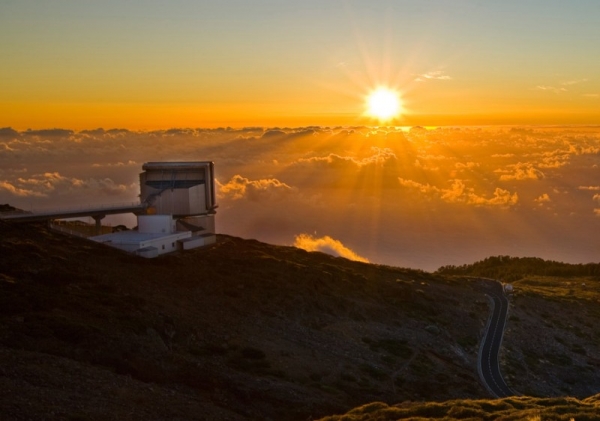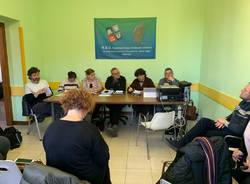On the island of La Palma, to study the birth of the solar system
Scientists from FOAM13, the foundation that manages the astronomical observatory in the “Pineta” Park, have received the go ahead to use the Galileo National Telescope, one of the largest, existing instruments for observing stars.
 Astronomers from Tradate are going to the island of La Palma, to study a new comet and the origin of the solar system. The scientists from FOAM13, the foundation that manages the astronomical observatory in the Pineta Park, have received the go ahead to use the Galileo National Telescope (TNG), one of the largest, existing star observation instruments, and the largest that is Italian owned. The authorisation has been given to a project to observe the comet 260P-McNaught. This periodic comet was discovered in 2005 by the astronomer Robert McNaught, and observed again in May 2012 by the Czech astronomer, Martin Masek. The period of its orbit is about 7 years, and, as the Tradate-based foundation explain, it is a new comet that has recently come into the vicinity of our Sun. “Observations made with the main telescope of FOAM13 and of the Astronomical Station in Sozzago, have aroused a lot of interest because of the morphological details that the comet has developed in the last few months.”
Astronomers from Tradate are going to the island of La Palma, to study a new comet and the origin of the solar system. The scientists from FOAM13, the foundation that manages the astronomical observatory in the Pineta Park, have received the go ahead to use the Galileo National Telescope (TNG), one of the largest, existing star observation instruments, and the largest that is Italian owned. The authorisation has been given to a project to observe the comet 260P-McNaught. This periodic comet was discovered in 2005 by the astronomer Robert McNaught, and observed again in May 2012 by the Czech astronomer, Martin Masek. The period of its orbit is about 7 years, and, as the Tradate-based foundation explain, it is a new comet that has recently come into the vicinity of our Sun. “Observations made with the main telescope of FOAM13 and of the Astronomical Station in Sozzago, have aroused a lot of interest because of the morphological details that the comet has developed in the last few months.”
“It’s important to study these small bodies,” the Foundation explain. “The typical dimensions of the nucleus of a comet can vary from a few hundred metres, to 20-40 km in diameter. They represent the oldest material in the construction of our Solar System, and could even be considered as “untouched” since the birth of the Solar System, about 5 billion years ago. The first results from the TNG images look very interesting, but it will take a few months to process and publish them in the most important Italian and international magazines.”
The Galileo National Telescope, has a diameter of 3.58 metres, and is situated in Roque de Los Muchachos, at the highest point of the island of La Palma (Canaries) at about 2400 metres above sea level. It is the most important optical instrument of the Italian astronomical community, and is one of the most important in the northern hemisphere. The applications to make observations at the TNG are made through the Italian Time Allocation Committee, who distribute them solely on the basis of their scientific merit, 75% of the available time. The remaining 25% of the time is at the disposal of the Spanish and international communities. “So it’s a great success and brings great satisfaction to have our application approved, and to be able to collaborate, professionally, with Italy’s most important and prestigious telescope,” explained Roberto Crippa, the chairman of FOAM13.
The approval to use the telescope was obtained thanks to the commitment of Federico Manzini, the head of the scientific section of the Astronomical Observatory Foundation in Tradate (FOAM13) and of the project FOAM13-TNG, together with Roberto Crippa, and Gigi Oldani with other collaborators, and also to the interest of Patrizia Caraveo, the director of the Institute of Spatial Astrophysics and Cosmic Physics (IASF) in Milan, and of Giovanni Bignami, the chairman of INAF (the Italian national institute of astrophysics).
La community di VareseNews
Loro ne fanno già parte
Ultimi commenti
Giulio Moroni su Barasso, il Comune rischia il blocco dei servizi per una sentenza di condanna da 300 mila euro
Stefano Montani su Contro l’indifferenza e la violenza: la musica scuote Varese in un grido per la Palestina
Felice su Sanpietrini staccati e resti di gavettoni: allarme maleducazione al Parco Mantegazza di Varese
Mastro SIM su Patentino obbligatorio per alcuni cani: la Lombardia vara la “save list”, ecco le razze coinvolte
Gloria Cerri su Patentino obbligatorio per alcuni cani: la Lombardia vara la “save list”, ecco le razze coinvolte
CarloP su Sanpietrini staccati e resti di gavettoni: allarme maleducazione al Parco Mantegazza di Varese
















Accedi o registrati per commentare questo articolo.
L'email è richiesta ma non verrà mostrata ai visitatori. Il contenuto di questo commento esprime il pensiero dell'autore e non rappresenta la linea editoriale di VareseNews.it, che rimane autonoma e indipendente. I messaggi inclusi nei commenti non sono testi giornalistici, ma post inviati dai singoli lettori che possono essere automaticamente pubblicati senza filtro preventivo. I commenti che includano uno o più link a siti esterni verranno rimossi in automatico dal sistema.